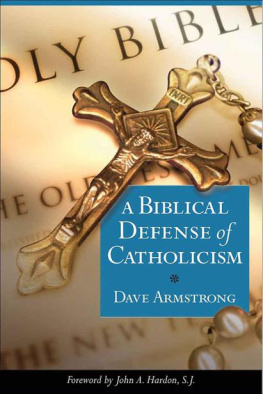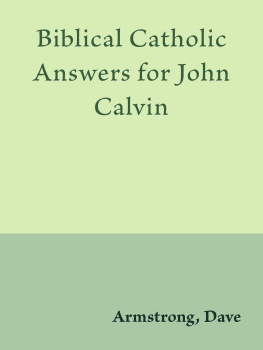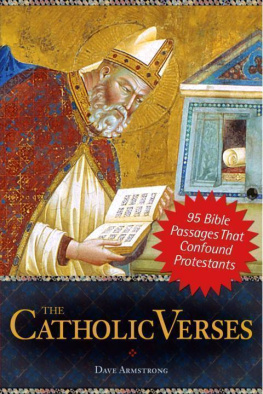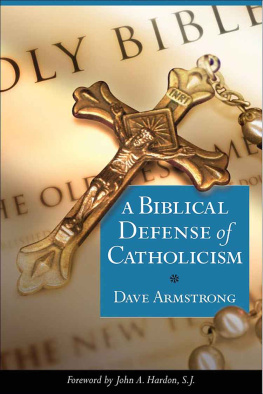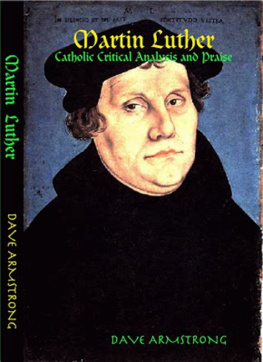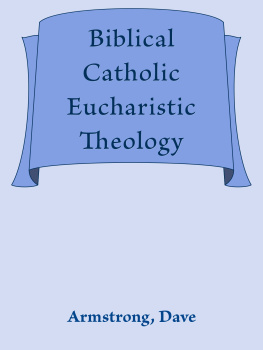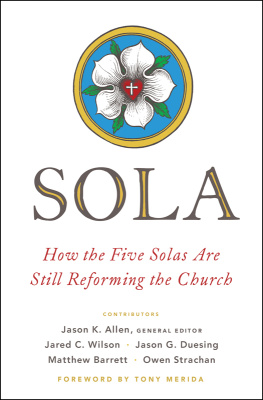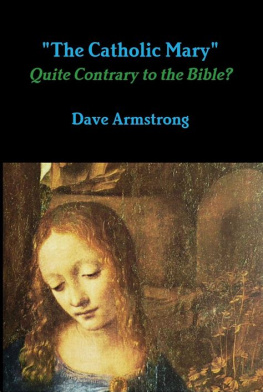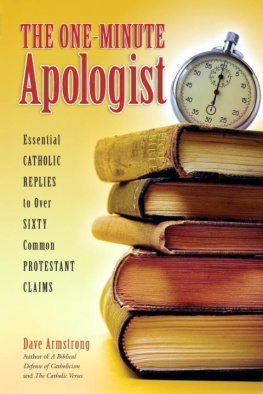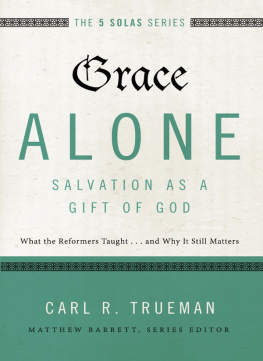Dave Armstrong - 100 Biblical Arguments Against Sola Scriptura
Here you can read online Dave Armstrong - 100 Biblical Arguments Against Sola Scriptura full text of the book (entire story) in english for free. Download pdf and epub, get meaning, cover and reviews about this ebook. year: 2012, publisher: Catholic Answers Press, genre: Religion. Description of the work, (preface) as well as reviews are available. Best literature library LitArk.com created for fans of good reading and offers a wide selection of genres:
Romance novel
Science fiction
Adventure
Detective
Science
History
Home and family
Prose
Art
Politics
Computer
Non-fiction
Religion
Business
Children
Humor
Choose a favorite category and find really read worthwhile books. Enjoy immersion in the world of imagination, feel the emotions of the characters or learn something new for yourself, make an fascinating discovery.

- Book:100 Biblical Arguments Against Sola Scriptura
- Author:
- Publisher:Catholic Answers Press
- Genre:
- Year:2012
- Rating:5 / 5
- Favourites:Add to favourites
- Your mark:
- 100
- 1
- 2
- 3
- 4
- 5
100 Biblical Arguments Against Sola Scriptura: summary, description and annotation
We offer to read an annotation, description, summary or preface (depends on what the author of the book "100 Biblical Arguments Against Sola Scriptura" wrote himself). If you haven't found the necessary information about the book — write in the comments, we will try to find it.
100 Biblical Arguments Against Sola Scriptura — read online for free the complete book (whole text) full work
Below is the text of the book, divided by pages. System saving the place of the last page read, allows you to conveniently read the book "100 Biblical Arguments Against Sola Scriptura" online for free, without having to search again every time where you left off. Put a bookmark, and you can go to the page where you finished reading at any time.
Font size:
Interval:
Bookmark:
Dave Armstrong
100 Biblical Arguments
Against Sola Scriptura
C A THOLIC
A NSWERS
PRESS
San Diego
2012
100 Biblical Arguments Against Sola Scriptura
2012 by Dave Armstrong
All rights reserved. Except for quotations, no part of this book may be reproduced or transmitted in any form or by any means, electronic or mechanical, including photocopying, recording, uploading to the Internet, or by any information storage and retrieval system, without written permission from the publisher.
Unless otherwise noted, biblical citations are taken from the Revised Standard Version of the Bible ( 1971 by Division of Christian Education of the National Council of the Churches of Christ in the United States of America).
Published by Catholic Answers, Inc.
2020 Gillespie Way
El Cajon, California 92020
1-888-291-8000 orders
619-387-0042 fax
catholic.com
Cover design by Devin Schadt
Interior design by Russell Design
Printed in the United States of America
ISBN 978-1-933919-69-0
For related reading on the authors blog, see:
The Bible, Church, Tradition, and Canon
http://socrates58.blogspot.com/2006/11/bible-church-tradition
canon-index.html
The Church
http://socrates58.blogspot.com/2006/11/church-index-page.html
The Papacy
http://socrates58.blogspot.com/2006/11/papacy-index-page.html
To my wife Judy and children Paul,
Michael, Matthew, and Angelina:
Thank you for the gift of your love and
understanding, and for being who you are.
Ive been blessed beyond all imagining.
Catholicism and Protestantism differ fundamentally with regard to authoritythe rule of faith, the basis or standard Christians use to determine true (and false) doctrine and practice. Protestantism tends to see a divide between the pure Word of God in the Bible and what the Catholic Church calls Sacred Traditionsomething Protestantism considers to be corrupted by traditions of men (Matt. 15:3-6; Mark 7:8-13). For Protestants, Scripture alone is the source and rule of the Christian faith. It is the only infallible authority, sufficient in and of itself for a full exposition of Christianity and for the attainment of salvation. This is what sola scriptura means. In Catholicism, by contrast, Scripture and Traditionrevealed Christian truths passed on outside of Scriptureare two fonts of the one spring of divine revelation. Without one or the other, revelation is incomplete.
Scripture frequently refers to the notion of tradition[s] : a body of knowledge or doctrine that existed prior to and is larger than Scripture itself. For example:
Acts 17:11, 13: Now these Jews were more noble than those in Thessalonica, for they received the word with all eagerness, examining the scriptures daily to see if these things were so.... But when the Jews of Thessalonica learned that the word of God was proclaimed by Paul at Beroea also, they came there too, stirring up and inciting the crowds.
The word or word of God in this context is clearly not Scripture, because Scripture is compared with it; it is, rather, apostolic preaching, which is synonymous with sacred Tradition. All true Tradition, like the preaching that is examined in the above passage, is harmonious with Scripture. This is the biblical and Catholic teaching.
Other terms besides word of God are used in the Bible to refer to apostolic Tradition, such as the faith (Eph. 4:13; Col. 1:23; 1 Tim. 4:1; Jude 3), the truth (Rom. 2:8; Gal. 5:7; 1 Tim. 2:4), the commandment (Mark 7:8; 2 Pet. 2:21; 1 John 2:7-8), the doctrine (Rom. 16:17; Titus 2:10; 2 John 1:9), and the message (1 Cor. 2:4; 2 Cor. 5:19; 2 Tim. 4:15). The biblical data on this score are overwhelming. A concise Catholic definition of sacred Tradition is found in the decrees of the First Vatican Council (1870), in the Dogmatic Constitution on the Catholic Faith :
This supernatural revelation, according to the universal belief of the Church, declared by the sacred Synod of Trent, is contained in the written books and unwritten traditions which, received by the Apostles from the mouth of Christ himself, or from the Apostles themselves, by the dictation of the Holy Spirit, transmitted, as it were, from hand to hand, have come down even to us.
There are many complexities and nuances involved in this discussion of Christian authority that will become apparent as we delve into it. Catholics and Protestants have misunderstood each other for centuries. Yet, although there are deeply held differences, there is also more common ground than one might suspect.
Before going any further, I should like to verify the preceding definitions of sola scriptura by citing three of its contemporary Protestant defenders. Norman Geisler, a prominent Evangelical Protestant apologist who has published many books, defines it as follows:
By sola scriptura orthodox Protestants mean that Scripture alone is the primary and absolute source of authority, the final court of appeal, for all doctrine and practice (faith and morals). It is important to repeat that Catholics often misunderstand the Protestant principle of sola scriptura to exclude any truth outside the Bible. This, of course, is untrue.... What Protestants mean by sola scriptura is that the Bible alone is the infallible written authority for faith and morals.... Scripture is the sufficient and final written authority of God. As to sufficiency, the Biblenothing more, nothing less, and nothing elseis all that is necessary for faith and practice... the Bible is clear (perspicuous). The perspicuity of Scripture does not mean that everything in the Bible is perfectly clear, but rather the essential teachings are. Popularly put, in the Bible the main things are the plain things and the plain things are the main things. This is not to say that Protestants obtain no help from the Fathers and early councils... this is not to say that there is no usefulness to Christian tradition, but only that it is of secondary importance.
Reformed Protestant writer Keith A. Mathison concurs, while emphasizing the role of the Church a little more strongly:
Scripture alone is inspired and inherently infallible. Scripture alone is the supreme normative standard. But Scripture does not exist in a vacuum. It was and is given to the Church within the doctrinal context of the apostolic gospel. Scripture alone is the only final standard, but it is a final standard that must be utilized, interpreted, and preached by the Church within its Christian context.
It is important to notice that sola scriptura , properly understood, is not a claim that Scripture is the only authority altogether.... There are other real authorities which are subordinate and derivative in nature. Scripture, however, is the only inspired and inherently infallible norm, and therefore Scripture is the only final authoritative norm.
He adds, It must be emphasized that the fallibility of the Church does not render her authority invalid.
Reformed Baptist James R. White, despite belonging to the extreme anti-Catholic fundamentalist wing of Protestantism, nevertheless agrees with Geisler and Mathison in this respect, as we see in his series of expositions detailing first what sola scriptura is not:
1. First and foremost, sola scriptura is not a claim that the Bible contains all knowledge.
Sola scriptura is not a claim that the Bible is an exhaustive catalog of all religious knowledge .... It is obvious that the Bible does not need to be exhaustive to be sufficient as our source of divine truth.
Sola scriptura is not a denial of the authority of the Church to teach Gods truth ... The Church, as the body of Christ, presents and upholds the truth, but she remains subservient to it.... There is no warrant for the Lone Ranger Christian Syndrome so popular in Protestant circles these days.
Font size:
Interval:
Bookmark:
Similar books «100 Biblical Arguments Against Sola Scriptura»
Look at similar books to 100 Biblical Arguments Against Sola Scriptura. We have selected literature similar in name and meaning in the hope of providing readers with more options to find new, interesting, not yet read works.
Discussion, reviews of the book 100 Biblical Arguments Against Sola Scriptura and just readers' own opinions. Leave your comments, write what you think about the work, its meaning or the main characters. Specify what exactly you liked and what you didn't like, and why you think so.

